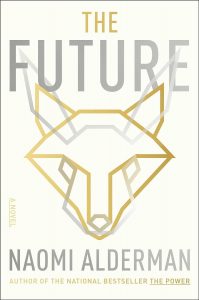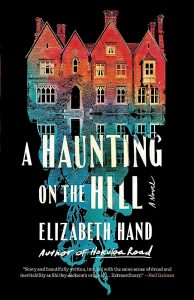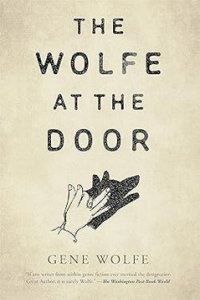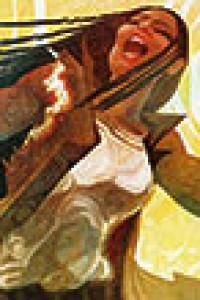The Year in Review 2023 by Graham Sleight

I’m always reluctant to pick out trends when summarising a year’s books for Locus. There are too many contingencies at play in what gets published when, and so much is dependent on which fraction of the torrent of SFF books I’ve managed to read. But this year, I do feel confident in one judgment: It was a really fine time to be reading books of the fantastic. The works I’m most enthusiastic about are as good as any year’s worth that I can remember.
 Naomi Alderman’s The Future (Simon & Schuster) took on tech billionaires and their bunkers with the same energy that distinguished The Power (2016). Nina Allan’s Conquest (Riverrun) was for me the author’s best novel yet – and that’s saying something. Elliptical and haunting, it’s one of those works that demands to be reread as soon as it’s finished. Nathan Ballingrud’s The Strange (Gallery) paid obvious tribute to Ray Bradbury’s The Martian Chronicles in its tale of a nostalgic settlement on the red planet. Butit ended up being very far from nostalgic – indeed, it was a thorough questioning of nostalgia. Lauren Beukes’s Bridge (Little, Brown) was a near-future thriller (the subgenre of the moment) with an energetic multiverse-driven plot. Cory Doctorow’s Red Team Blues (Tor) made forensic accountancy interesting – indeed, made it a window into the ways money and so power are held and concealed.
Naomi Alderman’s The Future (Simon & Schuster) took on tech billionaires and their bunkers with the same energy that distinguished The Power (2016). Nina Allan’s Conquest (Riverrun) was for me the author’s best novel yet – and that’s saying something. Elliptical and haunting, it’s one of those works that demands to be reread as soon as it’s finished. Nathan Ballingrud’s The Strange (Gallery) paid obvious tribute to Ray Bradbury’s The Martian Chronicles in its tale of a nostalgic settlement on the red planet. Butit ended up being very far from nostalgic – indeed, it was a thorough questioning of nostalgia. Lauren Beukes’s Bridge (Little, Brown) was a near-future thriller (the subgenre of the moment) with an energetic multiverse-driven plot. Cory Doctorow’s Red Team Blues (Tor) made forensic accountancy interesting – indeed, made it a window into the ways money and so power are held and concealed.
 Not a near-future thriller: Elizabeth Hand’s A Haunting on the Hill (Mulholland) was a thoughtful and entirely fitting companion toShirley Jackson’s original. Nick Harkaway’s Titanium Noir (Knopf) was a detective story, like so many of this year’s books digging into the question of what the extremes of wealth might mean in the future. Its science fictional device worked carefully to augment his argument. Catherine Lacey’s Biography of X (FSG) was a strange and utterly distinctive alternate history, an intricate reconstruction of a life and a world not quite ours. Of all the books I read this year, it was the one that felt the most singular. Helen Macdonald and Sin Blaché’s Prophet (Grove) was on the one hand an SF thriller (and, eventually, a romance). On the other, it dealt with one of the oldest questions: how we possess memories or how they possess us. Martin McInnes’s In Ascension (Atlantic) took a while to get going, but ended up as an uncanny and moving meditation on ecology, the unknown, and the urge to explore space. Stephen Markley’s The Deluge (Simon & Schuster) was a compelling and ambitious novel of the effects – practical, political, social – of climate change. My only reservation was that its focus on the US didn’t fully encompass this most global of problems. Whatever else may be wrong with Ian McDonald’s Hopeland (Gollancz), narrowness of focus wasn’t its problem. Jumping settings, tones, and years, there’s almost no current SF preoccupation it didn’t touch on. Annalee Newitz’s The Terraformers (Tor) also fizzed with ideas, this time in the context of the history of an altered planet over many centuries.
Not a near-future thriller: Elizabeth Hand’s A Haunting on the Hill (Mulholland) was a thoughtful and entirely fitting companion toShirley Jackson’s original. Nick Harkaway’s Titanium Noir (Knopf) was a detective story, like so many of this year’s books digging into the question of what the extremes of wealth might mean in the future. Its science fictional device worked carefully to augment his argument. Catherine Lacey’s Biography of X (FSG) was a strange and utterly distinctive alternate history, an intricate reconstruction of a life and a world not quite ours. Of all the books I read this year, it was the one that felt the most singular. Helen Macdonald and Sin Blaché’s Prophet (Grove) was on the one hand an SF thriller (and, eventually, a romance). On the other, it dealt with one of the oldest questions: how we possess memories or how they possess us. Martin McInnes’s In Ascension (Atlantic) took a while to get going, but ended up as an uncanny and moving meditation on ecology, the unknown, and the urge to explore space. Stephen Markley’s The Deluge (Simon & Schuster) was a compelling and ambitious novel of the effects – practical, political, social – of climate change. My only reservation was that its focus on the US didn’t fully encompass this most global of problems. Whatever else may be wrong with Ian McDonald’s Hopeland (Gollancz), narrowness of focus wasn’t its problem. Jumping settings, tones, and years, there’s almost no current SF preoccupation it didn’t touch on. Annalee Newitz’s The Terraformers (Tor) also fizzed with ideas, this time in the context of the history of an altered planet over many centuries.
Amid this year of kinetic, idea-a-sentence novels, it was a weird kind of relief to encounter B. Pladek’s Dry Land (University of Wisconsin), a slow and careful hymn to ecology and incremental growth. Its historical setting was carefully researched, and its fantastic content was understated and pointed. Christopher Priest’s Airside (Gollancz) was partly a return to old Priest themes: the instability of identity, the unreliability of stories. But it also had some new notes, not least a fine hallucinatory depiction of the uncanniness of airports. Geoff Ryman’s Him (Angry Robot) marked a very welcome return to novel-writing after many years for Ryman. Its story, mostly told from the point of view of the mother of a child who comes to believe they are Jesus, may strike some as blasphemous; to me, it’s more accurate to call it reverent. Francis Spufford’s Cahokia Jazz (Faber) was an alternate-world story that, like Michael Chabon’s The Yiddish Policemen’s Union (2007), set a detective story in an author-imagined enclave. Spufford has always been good at finding structures for his books and, without spoiling anything, Cahokia Jazz’s architecture is particularly effective. Finally, Some Desperate Glory by Emily Tesh (Tordotcom) was a space opera for which the word ‘‘audacious’’ seems too small. The swerves of its story were as exhilarating as any I can remember.
 Among collections, Christopher Barzak’s Monstrous Alterations (Lethe) was a fine selection of old tales newly told through a modern sensibility. Matthew Cheney’s The Last Vanishing Man (Third Man) is a collection as formidable as Cheney’s non-fiction, bringing together his often harrowing short fiction. Kelly Link’s White Cat, Black Dog (Random House) went far beyond its stated premise of retelling fairy tales. Link has always specialised in uncannily sudden shifts in register, and here she found a kind of story suiting that perfectly. Tom Reamy’s Under the Hollywood Sign (Subterranean) was a very welcome gathering of the short fiction of a writer who should be far more widely known – even if, as in the title story, he gives no one an easy ride. I found myself thinking of Jared Shurin’s Big Book of Cyberpunk (Vintage) as one of those anthologies that’s as much an argument as a collection of stories – though the stories are, thankfully, very fine. The argument, that cyberpunk has permeated SF much more, will no doubt continue to be debated. Michael Swanwick’s The Best of Michael Swanwick: Volume 2 (Subterranean) demonstrated the author’s unflagging inventiveness in shorter forms across both science fiction and fantasy. One certainly hopes for a Volume 3 in another 15 years’ time. Gene Wolfe’s The Wolfe at the Door (Tor) assembled much otherwise uncollected short fiction along with poetry and non-fiction. Inevitably it was an uneven volume, but the best stories were very good indeed.
Among collections, Christopher Barzak’s Monstrous Alterations (Lethe) was a fine selection of old tales newly told through a modern sensibility. Matthew Cheney’s The Last Vanishing Man (Third Man) is a collection as formidable as Cheney’s non-fiction, bringing together his often harrowing short fiction. Kelly Link’s White Cat, Black Dog (Random House) went far beyond its stated premise of retelling fairy tales. Link has always specialised in uncannily sudden shifts in register, and here she found a kind of story suiting that perfectly. Tom Reamy’s Under the Hollywood Sign (Subterranean) was a very welcome gathering of the short fiction of a writer who should be far more widely known – even if, as in the title story, he gives no one an easy ride. I found myself thinking of Jared Shurin’s Big Book of Cyberpunk (Vintage) as one of those anthologies that’s as much an argument as a collection of stories – though the stories are, thankfully, very fine. The argument, that cyberpunk has permeated SF much more, will no doubt continue to be debated. Michael Swanwick’s The Best of Michael Swanwick: Volume 2 (Subterranean) demonstrated the author’s unflagging inventiveness in shorter forms across both science fiction and fantasy. One certainly hopes for a Volume 3 in another 15 years’ time. Gene Wolfe’s The Wolfe at the Door (Tor) assembled much otherwise uncollected short fiction along with poetry and non-fiction. Inevitably it was an uneven volume, but the best stories were very good indeed.
It was an especially good year for SFF-related non-fiction. M. John Harrison’s ‘‘anti-memoir’’ Wish I Was Here (Serpent’s Tail) was dense, thoughtful, and with something on every page that spurred new thoughts. It would take another book again to unpack all the links back to Harrison’s fiction. In an almost identical shade of book-cover green, Niall Harrison’s All These Worlds (Briardene) collected superb reviews and essays grapplingwith the fantastic as a present-tense endeavour. Ursula K. Le Guin’s Space Crone (Silver Press) presented some of the author’s most directly political non-fiction in a way that, far more than one could have expected from a posthumous volume, presented a coherent worldview, the sense of knowing the author directly. And finally, Maureen Kincaid Speller’s A Traveller in Time (Luna Press) gathered the best essays of a much-missed critic who should have been able to write for many more years.
 It’s worth also mentioning a couple of associational works: Nicola Griffith’s Menewood (MCD) was the long-awaited sequel to Hild (2013) and more than fulfilled the promise of the first book. If there’s a single quality I’d identify about both, it’s a hypnotising level of attention paid to the world. R.F. Kuang’s Yellowface (Harpercollins) was a thriller of the literary life that took place on the borders of SFF – with a mention or two of Locus thrown in. It was a gripping story of unintended consequences. And I’m not even sure if it counts as a book, but the continuing multimedia story of Question Mark, Ohio, by Joe Meno and Dan Sinker should certainly be of interest to Locus readers. Told via AI-generated Instagram images (at @violetinquestion) and several satellite websites, it concerns a town in which some very strange things are happening. I don’t know if this new kind of story will become an established one, but I’m fascinated to find out.
It’s worth also mentioning a couple of associational works: Nicola Griffith’s Menewood (MCD) was the long-awaited sequel to Hild (2013) and more than fulfilled the promise of the first book. If there’s a single quality I’d identify about both, it’s a hypnotising level of attention paid to the world. R.F. Kuang’s Yellowface (Harpercollins) was a thriller of the literary life that took place on the borders of SFF – with a mention or two of Locus thrown in. It was a gripping story of unintended consequences. And I’m not even sure if it counts as a book, but the continuing multimedia story of Question Mark, Ohio, by Joe Meno and Dan Sinker should certainly be of interest to Locus readers. Told via AI-generated Instagram images (at @violetinquestion) and several satellite websites, it concerns a town in which some very strange things are happening. I don’t know if this new kind of story will become an established one, but I’m fascinated to find out.
Ten Books of the Year:
Conquest, Nina Allen (Riverrun)
White Cat, Black Dog, Kelly Link (Random House)
Biography of X, Catherine Lacey (Farrar, Straus, Giroux)
Prophet, Sin Blaché & Helen Macdonald (Grove)
Hopeland, Ian McDonald (Gollancz)
Dry Land, B. Pladek (University of Wisconsin)
Airside, Christopher Priest (Gollancz)
Him, Geoff Ryman (Angry Robot)
Cahokia Jazz, Francis Spufford (Faber)
Some Desperate Glory, Emily Tesh (Tordotcom)
This review and more like it in the February 2024 issue of Locus.
 While you are here, please take a moment to support Locus with a one-time or recurring donation. We rely on reader donations to keep the magazine and site going, and would like to keep the site paywall free, but WE NEED YOUR FINANCIAL SUPPORT to continue quality coverage of the science fiction and fantasy field.
While you are here, please take a moment to support Locus with a one-time or recurring donation. We rely on reader donations to keep the magazine and site going, and would like to keep the site paywall free, but WE NEED YOUR FINANCIAL SUPPORT to continue quality coverage of the science fiction and fantasy field.
©Locus Magazine. Copyrighted material may not be republished without permission of LSFF.







